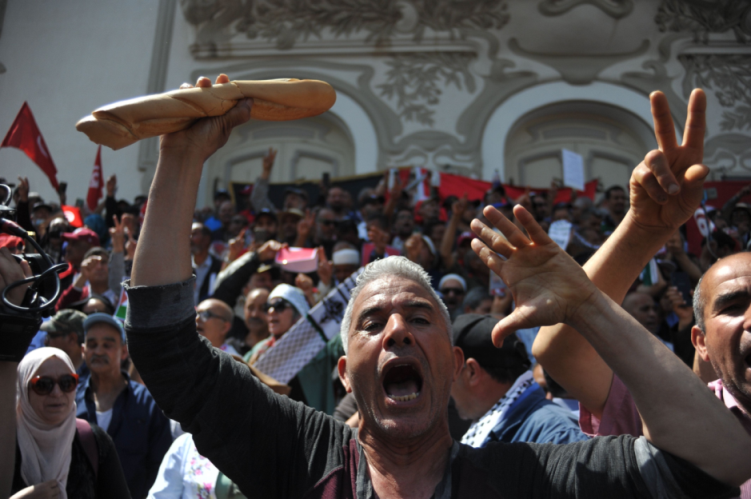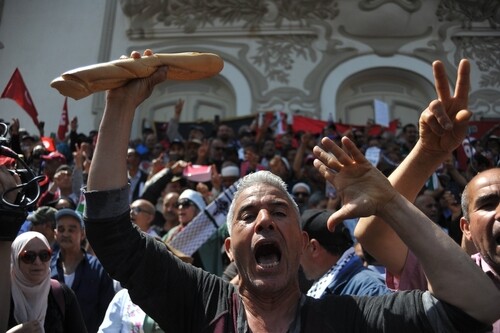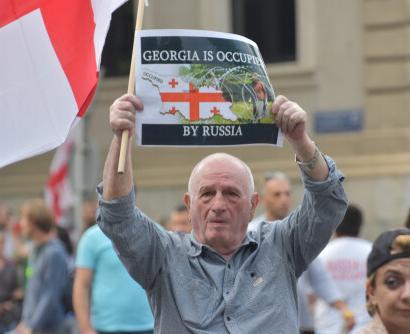Abstract: As the Tunisian parliamentary elections of 17.12.22 only amassed an 8% voter turnout, it has become clear that the North African country is not only in a socio-economic crisis but also in political stagnation. The constitutional coup of 2021 further consolidates this thinking. It seems that the democratization process of 2010-2014 has reached stagnation.
Problem statement: How have Tunisia’s socio-economic disparities hampered its democracy?
Bottom-up line front: The constitutional coup in the summer of 2021 brought the political transformation process in the Mediterranean state to an abrupt halt. As a result, voter turnout was low, partly due to boycotts and other socio-economic disruptions, in particular, this included the high youth unemployment rate, for example.
So what?: It appears to be that the democratic transformation process of 2011-14 can only be resumed if the centralist-oriented constitution is transformed into a decentralist-motivated one. At the same time, the economic foundations must be supported by neighboring and foreign countries.

Source: shutterstock.com/Hasan Mrad
The December 2022 Elections
The elections on 17.12.2022, whereby only 8% of the Tunisian electorate went to the polls, show once again that the frustration among the Tunisian population about the socio-economic conditions is not only intense but has found its way deep into the socio-cultural fabric of Tunisian society.[1] Many young Tunisians want to leave the country for better opportunities and, in some cases, even wish for a return to the pre-revolutionary conditions under former President General Ben Ali. Is a democratic turnaround in a country like Tunisia impossible because of the difficult pre-political and cultural-historical circumstances?
A State of Different Cultural Strands
The former Tunisian President Béji Caid Essebsi commented: “Tunisian society, unlike among other Maghreb states, is plural. It consists of Arabs, Muslims, Mediterraneans, Africans and Maghrebians. It is the origin of the heritage of Phoenician, Roman, Arab and European elements, which also encompass the philosophy of the state.”[2] According to the former president, such facts make Tunisian identity and Tunisian socio-cultural personalisation so specific.[3] He immediately pointed out that Tunisia had always been occupied by either the Vandals, the Byzantines, or European powers.
However, Tunisia was also strongly dependent on the Mediterranean environment. It shares its borders with European states to the east and west of the Mediterranean. Its location is in the heart of North Africa, yet it lies only 600 km away from Rome.[4] The former President of the Republic of Tunisia also highlighted the prosperity of the attractive Mediterranean tourist state, reported to be the first state of all the Maghreb countries to conclude a cooperation agreement with the European Union in 1995; well before the transformation process and democratic stagnation of 17 December 2022.[5] Tunisia differs from other Arab states in that, since Bourguiba, it has always sought and strived for moderation and consensus between its individual cultural strands and its traditional ones.[6] Similarly, it does not identify with extremist, political, ideological, or even religious determinants. According to Essebsi, Islam is the dominant religion and should thereafter be understood as a national identification. This national bracket is also the moderation between individual cultural-historical conditions that the small Mediterranean country brings. This includes not only Islamisation but also Romanic, Germanic, Turkish, and, above all, French cultural influences have shaped this small North African country, especially when one considers its political and educational structures, which, as in Turkey and France, are centralised.[7] Tunisian national pride reflects foreign policy realism and simultaneously celebrates the cohesion of social compromise, both internally and externally, and is thus: the foundation of tolerance.[8]
The former President of the Republic of Tunisia also highlighted the prosperity of the attractive Mediterranean tourist state, reported to be the first state of all the Maghreb countries to conclude a cooperation agreement with the European Union in 1995.
In his analysis, the deceased former president also points to an essential characteristic of the Tunisian Republic. Namely, since the “revolution” of 2010/11, the G8 nations have often advocated for the vision that a new Arab era dawns. More importantly, the upheaval started in Tunisia, which is why one should speak of a new Tunisian era, considering its history of independence is utterly different from that of other Arab member states in the Arab League and, incidentally, all other Maghreb states. On the one hand, Tunisia’s problem today is the reduction of the illiteracy rate and, at the same time – and this is the paradox – the integration of the high rate of university graduates into the labour market. Both factors lead to political, economic, socio-cultural frustration and, ultimately, also to the disposition of the practical assertiveness of the democratic process.[9] Islam can go hand in hand with democracy if the above-mentioned frustration parameters can be minimised.
Constitutionalism as the Foundation of the Tunisian National State Organisation
According to Essebsi, the term Islamic applies to religion in Tunisia, while the term Islamist, as used by the conservative Ennahda party since 1956/57, applies to an ideological-political orientation in Tunisia.[10] The religious teachings of Islam tend to only play a subordinate role, but political ideas and instructions for action are associated with them. Essebsi and the current President, Kais Said, tend to assume an Islamic legal and state order in which Sunni Islam plays a decisive role, but not an ideological-political one.[11] While a majority of Tunisian society is Islamic, Islam knows different variances and incorporates different levels of legitimacy in the state and legal order in the North African state.[12]
Essebsi and the current President, Kais Said, tend to assume an Islamic legal and state order in which Sunni Islam plays a decisive role, but not an ideological-political one.
Interestingly, this also means that in states like Tunisia, other factors besides Islam determine the state’s existence, especially when it comes to constitutional provisions, i.e., the state order.[13] In the case of the Maghreb state, the Ottoman Empire certainly played an important historical role alongside European colonization in determining the state’s order. Between 1836 and 1856, and also during the Crimean War, the Ottoman Empire had a constitutional reform that was reflected in the Tunisian constitution of 1861. The provinces of the Ottoman Empire were subjected to the constitution (reformed in 1876 and 1877) until 1908. The reforms were primarily constitutional and mainly affected the fiscal spheres of the provinces of the Ottoman elite apparatus.[14] The 19th-century Ottoman Empire was not only embroiled in global crises due to its spheres of power and zones of influence, but it had also grown massively dependent on European powers, such as France, in terms of financial policy. The constitutional reforms that Beyist Tunisia supported in the 19th century were designed to more effectively protect state order and economically from global crises such as the Crimean War in the 19th century.[15] However, this also strengthened the elites of this multi-ethnic empire. However, this led to the bankruptcy of the Osaman province of Tunisia between 1880/81 and thus to the colonisation of the Maghreb state by France, which, due to the lost war against the German Empire and the failed expedition in Mexico, apparently saw itself forced to seek territorial compensation in North Africa, but this did not lead to great social disparities.[16]
Moreover, the dominance of the European powers was not limited. After the collapse of the Ottoman Empire, the second constitutional phase began, in which states like Tunisia lived in colonial constitutionalism, meaning the North African country was not able to create its own constitution. With decolonisation, the third phase of constitutionalism began in 1956, when Tunisia gave itself a constitution, although it could be perceived as a façade.[17] Although the constitutional text of 1956 laid down restrictions on state power and certain fundamental values, in particular Article 3 of the Tunisian Constitution of 1956, which guaranteed freedom of expression, it did not lead to the state apparatus of power complying with this, quite the contrary.[18] It was Bourguiba and the political elite around him who determined what was democratic and what was not, which is why the cult of personality around Bourguiba has persisted to this day and has never been questioned, even in 2010/11.[19]
After the collapse of the Ottoman Empire, the second constitutional phase began, in which states like Tunisia lived in colonial constitutionalism, meaning the North African country was not able to create its own constitution.
There have been frequent constitutional amendments aimed at extending the term of office of heads of state, including the amendment of the Tunisian constitution in the early 1970s, when the first president, Habib Bourguiba, declared himself head of state for life.[20] At the center of this constitutional form is an Arab-dominated nationalism, which is also influenced by the centralist structure of the former colonial powers, in this case, French centralism. The organisation of the state, especially with the constitutional coup of 26/27 July 2021 and the associated dissolution of both chambers of the Tunisian parliament by Kais Said and the Tunisian police and army leadership, is characterised by a strong executive that hardly allows for liberal or even democratic factors.[21] In fact, the third constitutional phase was always about legitimising executive power in which military and police powers were expanded or reinstated. This has also been the case in Egypt and Algeria since the constitutional coup. Tunisia’s political system is shaped less by Islam or Islamist ideological extremism than by an ethnically based nationalism that contains religious elements and postulates a collective identity. From this and emphasized by Essebsi, Islamic constitutionalism can be defined as the union of the most diverse cultural identifications into a community of tolerance.
The Islamic Revolution in Iran in 1979 and the dogmatisation of religion in the Kingdom of Saudi Arabia raised the question of the normative effect of Islam in the state organisation more than ever before. The effect was not only analysed internally but especially externally.[22] Thus, in the early 1970s, when constitutional reform was confirmed for life, Bourguiba posed the question about which extent Islam as a state religion could be compatible with democracy. The first president and despot of the Tunisian republic made it clear that Islam, and even more so what the conservative Ennahda party demanded as the basis of a Tunisian constitutional order, was not compatible with the “modern” constitutionalism of the French type and form (here, above all, centralism).[23] The Ennahda party urged for the traditions and different schools of Islam (in the case of Tunisia, the Malekite school of thought) to be incorporated into the constitution.[24]
The first president and despot of the Tunisian republic made it clear that Islam, and even more so what the conservative Ennahda party demanded as the basis of a Tunisian constitutional order, was not compatible with the “modern” constitutionalism of the French type and form.
According to Bourguiba, this centralist form of government contains elements of secularism. It thus contradicts the dogmatic foundations of an Islamic legal order, as the oppositional Ennahda movement considered at the time and still propagates to some extent today. The “Pouvoir constituant,” represented by Bourguiba Caid Essebsi, who was already Minister of the Interior under him, and ultimately now also Kais Said as a constitutional professor and current state president, is by definition a constitution that places the national cohesion aspect before the rule of law, to prevent a dogmatic Islam in the state and legal order. This also makes it clear that the Tunisian elites always enforced the constitutions up to the constitutional coup. And this elite-created secularism is a centralist one that serves to partially preserve Arab-Tunisian nationalism without, ironically, resolving the socio-economic inequalities within Tunisian society.
Tunisia’s Economic and Trade Policy
Whether trade policy would lead to a change in the “Pouvoir constituant” and thus reduce the level of frustration, especially among Tunisian youth – possibly resulting in more participation in the democratic process and less emigration-, can hardly be answered. The Mediterranean state already had its economic regulations differentiated when compared to its Arab and African neighbours in the 1970s. Certain imports had to be authorised, for example, there were liberalised imports that only required certification. This import regime was called the “régime du certificat d’importation,” which ultimately allowed goods to be imported without major restrictions. On the other hand, licenses were needed for goods such as agricultural products. These were subject to a global quantitative restriction, which also applied specifically to industrial enterprises, here explicitly to the textile industry.[25] There were, and still are, bilateral trade agreements with France, some of which also contain import quotas, especially for luxury consumer goods such as cosmetics or drugstore products.[26] Certain imports were only allowed through state organisations, e.g., tea, coffee, sugar, bananas, or other fruits, as well as industrial semi-finished products.
While the import regulation system was rather rigid and centralised, the export regime was more permissive, as can still be seen today. Products produced in Tunisia could be exported with little difficulty, with the result that prices have remained high to the present day without the current inflation. The current price increases due to the global crises further exacerbate social disparities. A license, as for imports, was only required for goods such as fish or meat. It is and remains interesting that traditional products such as olive oil or phosphates may only be exported through Tunisian trade agencies, which the Ben Ali regime and its family clan knew how to exploit between the end of the 1980s and 2010/11. The family and regime ultimately facilitated the military coup of 2011 based on the popular uprising against its regime as well as the constitutional coup of the old elites. With the constitutional reform in 1973 and the establishment of an authoritarian system under Habib Bourguiba, import opportunities were also expanded simultaneously.[27] This applied especially to those companies that were 66% dominated by foreign investors. They were allowed to import goods and services into Tunisia without major restrictions.[28]
It is and remains interesting that traditional products such as olive oil or phosphates may only be exported through Tunisian trade agencies, which the Ben Ali regime and its family clan knew how to exploit between the end of the 1980s and 2010/11.
In the 1980s, the import quota was frozen due to increased unemployment and impoverishment (bread riots in the early 1980s).[29] In 1985, even more, far-reaching restrictions were imposed on capital goods, which increased economic prosperity and corruption immeasurably and encouraged a bloodless coup by General Ben Ali at the end of the 1980s, which thereafter established a regime of corruption. In addition, an import tax was levied in 1986, which immediately flowed into export-promoting measures. At the same time, it caused Tunisia’s economic-industrial development to stagnate, except for the tourism sector. Only with the support of the IMF and the World Bank to stabilise the country’s socio-economic situation were the regulations minimised. This applied to the pharmaceutical and agricultural sectors, which again illustrates the drastic nature of the overall economic situation in the 1980s. Shortly before the coup of the secret service and the state police by Ben Ali, maximum tariffs were reduced from 236 % to 52% in 1987 and finally to 43% in 1988 – the year of the coup.[30]
Nonetheless, this did not save the regime around Bourguiba, who tried to maintain his despotism. In the 1990s, the Ben Ali family clan continued the liberalization trend, and in 1992 import quotas were almost completely abolished, with restrictions on 900 goods.[31] At the same time, a five percent fee was levied on all customs revenues, which continued to benefit the centralist system around Ben Ali and his family. Under pressure from the IMF, these fees were abolished again in 1994. However, certain restrictions of a quantitative nature were very trickily transferred into a negative list so that the regime could continue to manipulate the economy without affecting the state budget. Export monopolies, especially on olive oil and phosphates, continued to exist (only abolished in 1993 for olive oil).[32] This, of course, benefited the state’s economic manipulation and in no way reduced the impoverishment rate of the majority of the Tunisian population. Only with the implementation of the Tunisian import regime in bilateral and multilateral trade agreements was Tunisia forced to make certain economic adjustments. This applies in particular to the 2003 Association Agreement with the EU. It created a quasi-free trade zone whereby tariffs for industrial products, in particular, were further reduced, but no further changes were made for agricultural products.[33] Unfortunately, Tunisia’s participation in the General Agreement on Tariffs and Trade did not lead to further economic liberalisation tendencies.
In the end, Tunisia’s economic policy can be assessed in four phases. First, there was an era of liberalisation of company and product-related import facilitation in the early 1970s, during which the Bourguiba system sought to stabilise itself. From 1983-86, shortly before the Ben Alis coup and at the time of Tunisia’s most severe poverty crisis, there was a general increase in import restrictions and, at the same time, the promotion of an export-oriented industry. From 1986, the decline of the “bourgibist dynasty,” the remaining restrictions were dismantled, and the customs regime was simplified, although customs tariffs did not decrease noticeably. Ben Ali’s more liberal economic policy from the 1990s onwards was characterised by entry into the global economic system. It becomes clear that neither the erection, the dismantling of economic barriers, the adaptation to external economic mechanisms, nor the integration into the global market system contributed to the manifestation of the democratic process in Tunisia or the institutionalisation of socio-political changes. Rather, the regime around Bourguiba, Ben Ali, and the political classes after Ben Ali adapted to the neo-classical system of the IMF without any fundamental transformation of the political system. Arguably, it contributed to and conditioned the preservation of the socio-economic circumstances at the time.
It becomes clear that neither the erection, the dismantling of economic barriers, the adaptation to external economic mechanisms, nor the integration into the global market system contributed to the manifestation of the democratic process in Tunisia or the institutionalisation of socio-political changes.
Tunisia’s centralist system is highly adaptable, especially since it has repeatedly and selectively dismantled trade barriers even after 2011 without really addressing the socio-economic grievances.[34] For example, on 14 December 2022, three days before Tunisia’s parliamentary elections, the Maghreb Post made it clear that the small North African Mediterranean state is among Africa’s top 10 most indebted states. Tunisia’s foreign debt amounts to USD 41.6 billion.[35] This puts Tunisia in 7th place among the most indebted states in Africa, with USD 7.6 billion belonging to private investors, a sum that does not exactly improve the country’s socio-economic situation.
The total debt burden had doubled since 2010 when the popular uprising began. The neighbouring country, Algeria, is better off than Tunisia with 7.4 billion USD. Algeria’s debt burden has not increased significantly since 2021, attributable to its wealth in raw materials. Crucially, however, the money has not gone into investment but mainly into stabilising Algeria’s ancien régime or into the structures of the corrupt apparatus that continues to administer the ills of the socio-economic-nationalist network.[36] In the end, it seems to have been clear since the 1960s and 1970s that the aim was always to avoid national bankruptcy and to increase foreign currency reserves, which is why specific regulatory measures have always been more or less restrictive from one coup to the next.
Bourgibist Nationalism as a Permanent Vehicle of Political and Socio-Economic Disaster
Even if the former late president Essebsi, and Kais Said, the current president of the republic, emphasise Bouguibist nationalism through its reforms, such as the abolition of polygamy and the new position of women through emancipation in Tunisian society. Since 1965, the labour market process has reflected that, whereby women started occupying decisive positions, becoming a focus of their discourse. Disappointingly so, the modernisation course has not helped to minimise socio-economic and, thus, socio-political distortions.[37] This also applies to the education sector, which has been abstracted from the religious factors of Zaituna University in Kairouan. Still, a majority of graduates are now on the streets, without any major prospects, especially due to the inflationary development since 2010/11, as well as the burden of debt. Until his death, Essebsi held the conservative Ennahda party, which played a decisive role until the dissolution of the parliament in 2021, responsible for this development.[38] He pointed out, as did Kais Said during the constitutional coup, that the largest faction in the then-elected parliaments since 2011 rejected the idea of a national dialogue for the further development of Tunisia, both in terms of state organisation and economic and social parameters, and specialised purely in the question of cultural-religious-traditional factors.[39] In addition to the politically motivated assassinations of Chokri Belaid and Muhammed Brahimi in July 2013, the consequence was not only the discrediting of the democratic process and the strengthening of extremist forces but also: the deepening of economic mismanagement.[40]
Since 1965, the labour market process has reflected that, whereby women started occupying decisive positions, becoming a focus of their discourse.
Ruling as Ben Ali Did
The strengthening of certain elites of the Ancien regime, but also extremist forces, is not the only reason for Tunisia’s economic and political stagnation. The more communist-oriented Union Générale Tunisienne du Travail (UGTT) trade union confederation certainly played as significant a role in the decolonisation of the 1950s as it did in the popular uprising of 2010/11. The call for a boycott of the elections on 17 December 2022 is all the more worrying in part. It represents a coalition between the communist-oriented UGTT and the conservative Ennahda movement, which are by no means interested in entering into a dialogue with Kais Said to revise the constitutional coup of last year since the massive national debt.[41] The latter can now further expand the centralist-rigid system through the constitutional referendum of the summer of 2022, which was held with an already low voter turnout. He will rule by decree, as Ben Ali once did, and the new constitution even allows him to appoint and dismiss judges, as his long-time predecessor once did.[42] The government he appoints has no visible powers. He rules like Bourguiba and Ben Ali once did. He made this quite clear during the constitutional coup in July 2021, with the help of the security organs, that he regards political parties as a discontinued model.
Like Ben Ali in the 1980s, Kais Said is the beneficiary of many successive crises and corrupt-elitist entanglements, which he has been able to exploit like Ben Ali, the secret service general. Still, his constitutional reform is less ambitious than that of 2014.[43] On the contrary, it remains in place in matters such as the death penalty. He is more conservative than the opposition Ennahda party. The depth of Tunisia’s state failure is shown by the extreme rubbish problems, which even the president, who governs almost alone, has been unable to solve. Said problems have led to protests with one death. The enormous stench in many areas of Tunisia leads not only to respiratory diseases and allergies but now also to miscarriages, which, in addition to the problem of emigration due to a lack of prospects, are not only becoming a demographic problem but also a further socio-economic and political deficiency factor.[44] Tunisia’s youth sum up the state’s failure since 2010 as follows: “There is no future, no money, no work.”
Like Ben Ali in the 1980s, Kais Said is the beneficiary of many successive crises and corrupt-elitist entanglements, which he has been able to exploit like Ben Ali, the secret service general. Still, his constitutional reform is less ambitious than that of 2014.
On the other hand, there are diseases, poverty, no education, and exorbitant littering, in addition to the high level of the national debt. This means that what the Bey of Tunisia once proclaimed in 1804, namely that Tunisia would follow a path of an Islamic state different from that of the other Arab states, namely that of a modern secular Islamic state in the middle of the Ottoman Empire, has not even come close to being fulfilled.
Ilya Zarrouk, born 1981, studied modern history/economics and social history and political science in Mannheim, Heidelberg and Tunis. He is of Tunisian descent from his father’s side and is concerned with military structures and the constitutional conditions that determine these military structures. Since 2013, Zarrouk lectured at various evening academies in the Rhine-Neckar region, where he still lectures on security and military policy issues. The views contained in this article are the author’s alone.
[1] Tagesschau.de, 17.12.2022, 09.45.
[2] Béji Caid Essebsi avec Arlette Chabot, Tunisie la démocratie en terre d’Islam, (Paris, 2016), 28.
[3] Idem.; See also: Lotfi Hajji, Bourguiba et l’ Islam. Le politique et le religieux, Tunis 2011.
[4] Idem.
[5] Alma Laiadhi, Geschlechtergerechter Konstitutionalismus in Tunesien. Eine Analyse der tunesischen Verfassung von 2014, (Baden-Baden, 2022), 52-58.
[6] Lotfi Hajji, Bourguiba et l’ Islam. Le politique et le religieux, Tunis 2011.
[7] Abdelmajid Guelmami, La politique sociale en Tunisie de 1881 à nos jours, (Paris, 1996), 23-29.
[8] Béji Caid Essebsi avec Arlette Chabot, Tunisie la démocratie en terre d’Islam, (Paris, 2016),30-35.
[9] Idem.
[10] Idem.
[11] Lotfi Hajji, Bourguiba et l’Islam. Le politique et le religieux, (Tunis, 2011), 23-31, See also: Amor Chadli, Bourguiba. Tel que je l’ai connu. La transition Bourguiba-Ben-Ali, (la Marsa, 2011).
[12] Jean Meyer, Histoire de la France coloniale des origines à 1914,411-440.
[13] Idem.
[14] Idem.
[15] Lotfi Hajji, Bourguiba et l’Islam. Le politique et le religieux, (Tunis, 2011), 23-31.
[16] Michael Epenkenhans, Der Deutsch-Französische Krieg 1870/71, (Ditzinger, 2020), 133.
[17] Amor Chadli, Bourguiba. Tel que je l’ai connu. La transition Bourguiba-Ben-Ali, (la Marsa 2011).
[18] Alma Laiadhi, Geschlechtergerechter Konstitutionalismus in Tunesien. Eine Analyse der tunesischen Verfassung von 2014, (Baden-Baden, 2022), 52-58.
[19] Abdelmajid Guelmami, La politique sociale en Tunisie de 1881 à nos jours, (Paris, 1996).
[20] Tagesschau.de, 25.07.22, 14.30.
[21] Lotfi Hajji, Bourguiba et l’Islam. Le politique et le religieux, (Tunis, 2011), 155-161.
[22] Idem.
[23] Béji Caid Essebsi avec Arlette Chabot, Tunisie la démocratie en terre d’Islam, (Paris, 2016), 46-49.
[24] Idem.
[25] Thomas Richter, Autoritäre Herrschaft, materielle Ressourcen und Außenwirtschaftsreformen. Marokko, Tunesien, Ägypten und Jordanien im Vergleich, (Wiesbaden, 2011), 216-220; See also: Abdelmajid Guelmami, La politique sociale en Tunisie de 1881 à nos jours, (Paris, 1996), 187.
[26] Idem.
[27] Guy Arnold, Wars in the Third World since 1945. Tunisia: an end of colonialism 1952-1962, 53-55.
[28] Amor Chadli, Bourguiba. Tel que je l’ai connu. La transition Bourguiba-Ben-Ali, (la Marsa, 2011).
[29] Thomas Richter, Autoritäre Herrschaft, materielle Ressourcen und Außenwirtschaftsreformen. Marokko, Tunesien, Ägypten und Jordanien im Vergleich, (Wiesbaden, 2011), 216-220.
[30] Abdelmajid Guelmami, La politique sociale en Tunisie de 1881 à nos jours, (Paris, 1996),213.
[31] Idem.
[32] Thomas Richter, Autoritäre Herrschaft, materielle Ressourcen und Außenwirtschaftsreformen. Marokko, Tunesien, Ägypten und Jordanien im Vergleich, (Wiesbaden, 2011), 216-220.
[33] Amor Chadli, Bourguiba. Tel que je l’ai connu. La transition Bourguiba-Ben-Ali, (la Marsa, 2011).
[34] Idem.
[35] Maghreb-Post.de, 14.12.22.
[36] Idem.
[37] Idem.
[38] Lotfi Hajji, Bourguiba et l’Islam. Le politique et le religieux, (Tunis, 2011) 155-161.
[39] Béji Caid Essebsi avec Arlette Chabot, Tunisie la démocratie en terre d’Islam, (Paris, 2016), 46-49.
[40] Idem.
[41] Tagesschau.de, 17.12.22, 08.03.
[42] Tagesschau.de, 25.07.22, 02.30.
[43] Idem.
[44] Tagesschau.de, 18.12.2022, 03.33.






